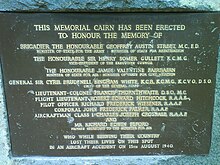Canberra air disaster, 1940

Plaque of Memorial Cairn (1960) at the site of the disaster
|
|
| Accident summary | |
|---|---|
| Date | 13 August 1940 |
| Summary | Stall on landing |
| Site |
Canberra, Australian Capital Territory 35°19′06″S 149°13′45″E / 35.3184°S 149.2293°ECoordinates: 35°19′06″S 149°13′45″E / 35.3184°S 149.2293°E |
| Passengers | 6 |
| Crew | 4 |
| Fatalities | 10 (all) |
| Injuries (non-fatal) | 0 |
| Survivors | 0 |
| Aircraft type | Lockheed Hudson |
| Operator | Royal Australian Air Force |
| Registration | A16-97 |
| Flight origin | Melbourne |
| Destination | Canberra |
The 1940 Canberra air disaster was an aircraft crash that occurred near Canberra, the capital of Australia, on 13 August 1940, during World War II. All ten people on board were killed: six passengers, including three members of the Australian Cabinet and the Chief of the General Staff; and four crew. The aircraft is believed to have stalled on its landing approach, when it was too low to recover.
The deaths of the three cabinet ministers severely weakened the United Australia Party government of Robert Menzies and contributed to its fall in 1941.
The Ministers and General White, with their staff, were being flown from Melbourne to Canberra for a Cabinet meeting. The aircraft, a RAAF Lockheed Hudson II bomber, was flown by an experienced Royal Australian Air Force (RAAF) officer, Flight Lieutenant Robert Hitchcock. The aircraft, A16-97, had been in service with the RAAF since 20 June 1940, and was being operated by No.2 Squadron.
The Perth Daily News reported: "The plane was seen by watchers at the Canberra Aerodrome and the Air Force station to circle the drome, and then rise and head south. It disappeared behind a low tree-dotted hill. There was an explosion and a sheet of flame, followed by a dense cloud of smoke... The Canberra Fire Brigade and ambulances from Canberra and Queanbeyan, across the border in New South Wales, as well as several Air Force tenders, arrived soon afterwards and fire extinguishers were played on the blazing wreckage. After about half-an-hour, when the blaze had died down, it was seen that the entire undercarriage, wings and structural supports of the plane had been torn away and were a smouldering mass in which were the charred bodies of those on board."
...
Wikipedia
